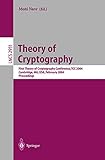Theory of Cryptography [electronic resource] : First Theory of Cryptography Conference, TCC 2004, Cambridge, MA, USA, February 19-21, 2004, Proceedings /
Material type: TextSeries: Lecture Notes in Computer Science ; 2951Publisher: Berlin, Heidelberg : Springer Berlin Heidelberg : Imprint: Springer, 2004Edition: 1st ed. 2004Description: XII, 532 p. online resourceContent type:
TextSeries: Lecture Notes in Computer Science ; 2951Publisher: Berlin, Heidelberg : Springer Berlin Heidelberg : Imprint: Springer, 2004Edition: 1st ed. 2004Description: XII, 532 p. online resourceContent type: - text
- computer
- online resource
- 9783540246381
- 005.824 23
- QA268
Notions of Reducibility between Cryptographic Primitives -- Indifferentiability, Impossibility Results on Reductions, and Applications to the Random Oracle Methodology -- On the Random-Oracle Methodology as Applied to Length-Restricted Signature Schemes -- Universally Composable Commitments Using Random Oracles -- Transformation of Digital Signature Schemes into Designated Confirmer Signature Schemes -- List-Decoding of Linear Functions and Analysis of a Two-Round Zero-Knowledge Argument -- On the Possibility of One-Message Weak Zero-Knowledge -- Soundness of Formal Encryption in the Presence of Active Adversaries -- Rerandomizable and Replayable Adaptive Chosen Ciphertext Attack Secure Cryptosystems -- Alternatives to Non-malleability: Definitions, Constructions, and Applications -- A Note on Constant-Round Zero-Knowledge Proofs for NP -- Lower Bounds for Concurrent Self Composition -- Secret-Key Zero-Knowlegde and Non-interactive Verifiable Exponentiation -- A Quantitative Approach to Reductions in Secure Computation -- Algorithmic Tamper-Proof (ATP) Security: Theoretical Foundations for Security against Hardware Tampering -- Physically Observable Cryptography -- Efficient and Universally Composable Committed Oblivious Transfer and Applications -- A Universally Composable Mix-Net -- A General Composition Theorem for Secure Reactive Systems -- Unfair Noisy Channels and Oblivious Transfer -- Computational Collapse of Quantum State with Application to Oblivious Transfer -- Implementing Oblivious Transfer Using Collection of Dense Trapdoor Permutations -- Composition of Random Systems: When Two Weak Make One Strong -- Simpler Session-Key Generation from Short Random Passwords -- Constant-Round Oblivious Transfer in the Bounded Storage Model -- Hierarchical Threshold Secret Sharing -- On Compressing Encrypted Data without the Encryption Key -- On the Notion of Pseudo-Free Groups.


There are no comments on this title.